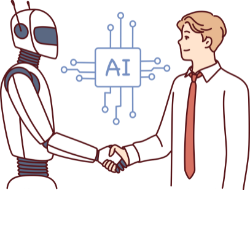How AI will change the way we work

Artificial intelligence (AI) is a rapidly expanding technology in our businesses. AI has long since moved beyond the realms of science fiction to become an everyday reality for organisations of all sizes, from agile start-ups to large multinationals. It has the power to change the way we make decisions, automate tasks, interact with our customers and optimise our operations. However, as AI grows in importance, so does the need to understand it and incorporate it strategically, ethically and effectively into our organisations.
What is AI?
It is a complex field that brings together several techniques and approaches whose aim is to help find information, make a decision or carry out a task. The different types of AI include :
- Weak and strong AI
- Machine learning
- Artificial neural networks
The list above goes from the simplest to the most complex. These different types of AI have a place in various applications, and their implementation and maintenance costs vary according to their complexity. It is therefore important to define your needs clearly so that you can implement the type of AI that best meets them.


What are the areas of application of AI in business?
Artificial Intelligence is transforming the way organisations operate and interact with their environment, whatever their sector of activity or business:
- Marketing: to personalise the customer experience, analyse marketing data or better target advertising.
- Human Resources: to secure the recruitment process or optimise resource management.
- Supply chain: to optimise planning and scheduling options, as well as improving stock management by anticipating customer consumption.
- Finance: by improving fraud detection and analysing market data to optimise investment decisions.
- Customer service: by adding AI to a chatbot that will be able to predict customer reactions and anticipate their expectations.
These areas are just the beginning of the influence of AI in organisations, and these few examples show that no business or activity is immune.
What advice do you have for successfully integrating AI into your business?
Integrating artificial intelligence (AI) into an organisation is a structured process that requires careful planning and methodical execution. For the project to be a success, it is essential to follow a number of key steps:
1- Assess needs: to clearly identify the problems to be solved, the opportunities to be exploited and the objectives to be achieved through AI. This careful assessment will lay the foundations for an appropriate AI project.
2- Collecting the data: this is a crucial stage, requiring in-depth cleansing, as the data will drive the AI models.
3- Choosing the technology: this is an equally important stage. Support from a specialist will ensure that the choice is in line with your needs and budget.
4- Creating the models: this is the job of the data scientists, who will design the algorithms and adjust the parameters to obtain optimum performance.
5- Implement: finally comes the time for deployment. This stage involves developing applications or integrating third-party systems. The involvement of the employees concerned must be total.
6- Monitor and improve: as with any system, maintenance is necessary and performance monitoring must be the subject of gap analysis and corrective action.


What are the challenges involved in implementing AI?
The integration of artificial intelligence (AI) into businesses is not without its challenges and concerns. Among the main concerns, ethical aspects play a central role, as well as societal aspects such as the consumption of server resources.
- Ethical challenges: Algorithmic biases and automated decision-making raise questions about responsibility in the event of error. It is essential to take this into account. This is why we still have to assume that AI can be far-fetched and verified.
- Fears linked to employment: Undoubtedly, the advent of AI will have an impact on the major employment balances in the same way as the advent of mechanisation did in the 20th century. Skills will have to be re-evaluated, training provided and resources reallocated in line with the jobs that have been changed and created.
- The financial impact: Over and above the cost of implementing AI, we need to calculate the costs of using it, because it is not free, and like all energy, it requires resources: data processing and storage, computing power, equipment and software maintenance.
- Environmental impact: the previous point implies that AI leads to an increase in server consumption. This is true. The volumes of data stored are increasing because they are needed to feed the AI. In this age of energy sobriety, it is important to counterbalance an AI project with a CSR approach.
What does the future hold for AI in business?
Artificial intelligence (AI) is constantly evolving, opening up new possibilities and exciting technological advances every day. Here are the emerging trends that will shape the future of our businesses.
- Conversational AI: also known as Automatic Natural Language Processing (NLP), is revolutionising the way businesses interact with their customers, teams and partners. The areas of application will be virtual assistants.
- Ethical AI: is becoming increasingly important in the field of AI, in response to concerns about algorithmic bias, transparency, environmental impact and privacy protection. It will be found in aspects of support for governance and compliance with regulations, but also to guarantee bias, fairness and protection of privacy.
- Quantum AI: is at the frontier of AI innovation and is still in its infancy. It relies on the principles of quantum mechanics to solve complex problems exponentially. This will enable calculations that are infinitely faster and more powerful than they are today.
The future of AI in business is opening up abysmal prospects, with emerging trends offering new opportunities for innovation, improved customer experience and competitiveness.

Artificial intelligence has the potential to transform the way businesses operate and innovate. By proactively and ethically exploring AI in business, you can not only stay competitive, but also help shape a smarter, more efficient future for your organisation. It’s time to put AI to work in your business and unlock its potential for long-term growth and success.